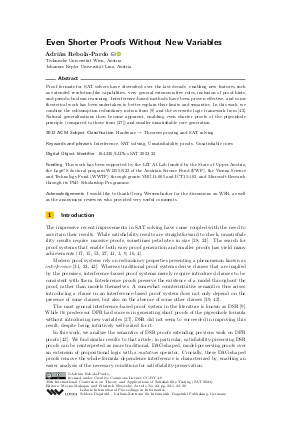@InProceedings{rebolapardo:LIPIcs.SAT.2023.22,
author = {Rebola-Pardo, Adri\'{a}n},
title = {{Even Shorter Proofs Without New Variables}},
booktitle = {26th International Conference on Theory and Applications of Satisfiability Testing (SAT 2023)},
pages = {22:1--22:20},
series = {Leibniz International Proceedings in Informatics (LIPIcs)},
ISBN = {978-3-95977-286-0},
ISSN = {1868-8969},
year = {2023},
volume = {271},
editor = {Mahajan, Meena and Slivovsky, Friedrich},
publisher = {Schloss Dagstuhl -- Leibniz-Zentrum f{\"u}r Informatik},
address = {Dagstuhl, Germany},
URL = {https://drops.dagstuhl.de/entities/document/10.4230/LIPIcs.SAT.2023.22},
URN = {urn:nbn:de:0030-drops-184844},
doi = {10.4230/LIPIcs.SAT.2023.22},
annote = {Keywords: Interference, SAT solving, Unsatisfiability proofs, Unsatisfiable cores}
}

 Creative Commons Attribution 4.0 International license
Creative Commons Attribution 4.0 International license

